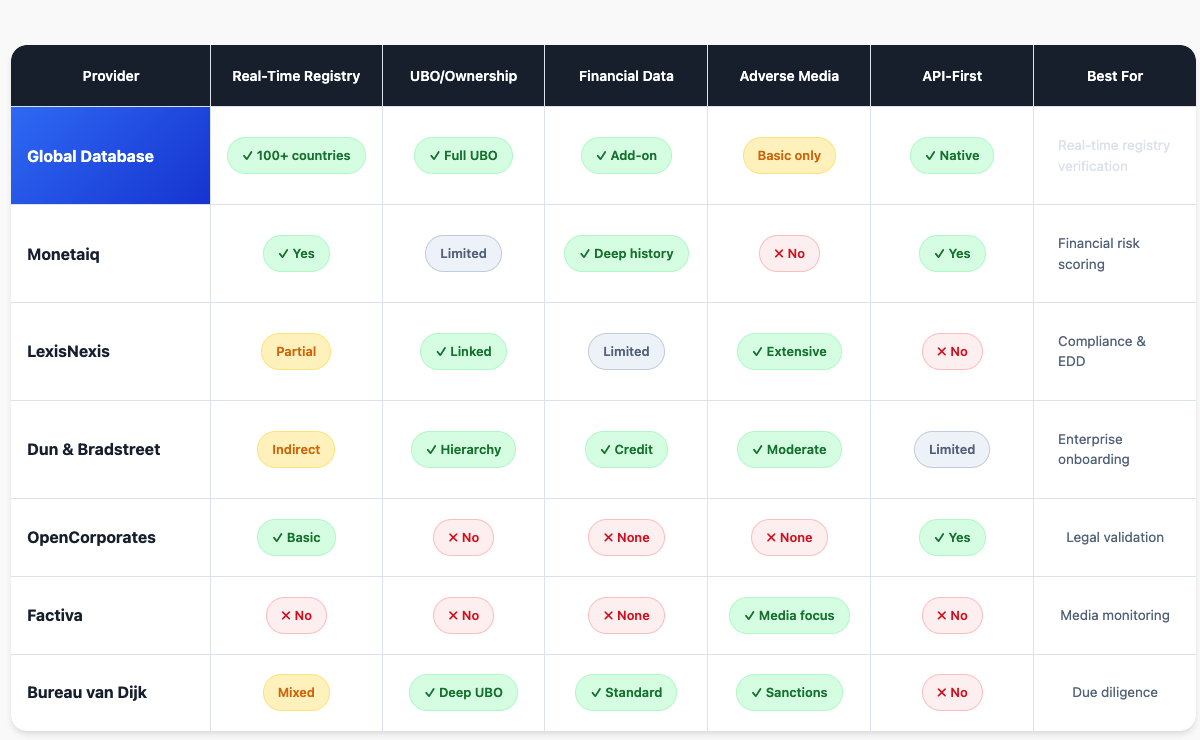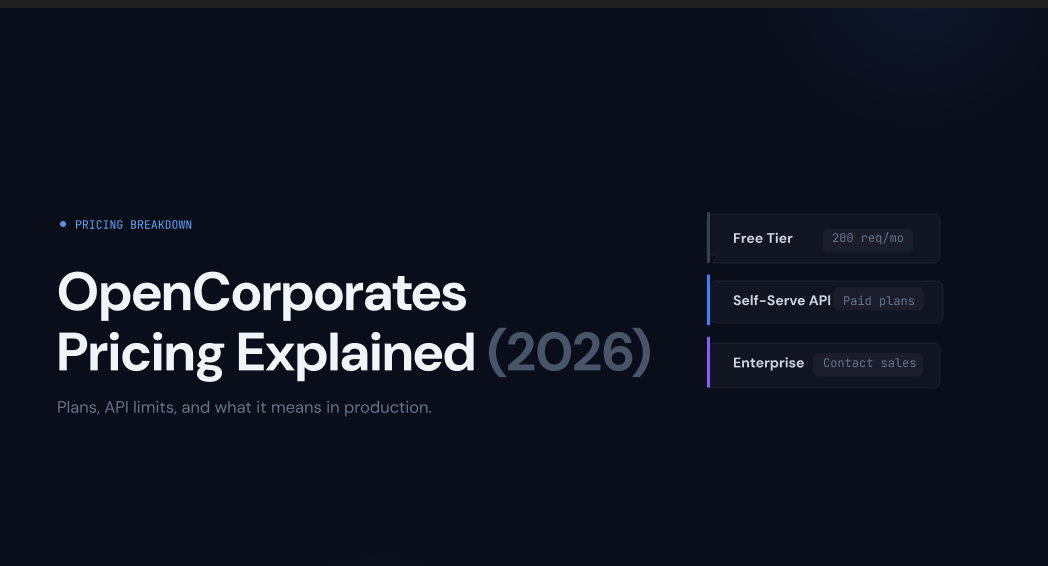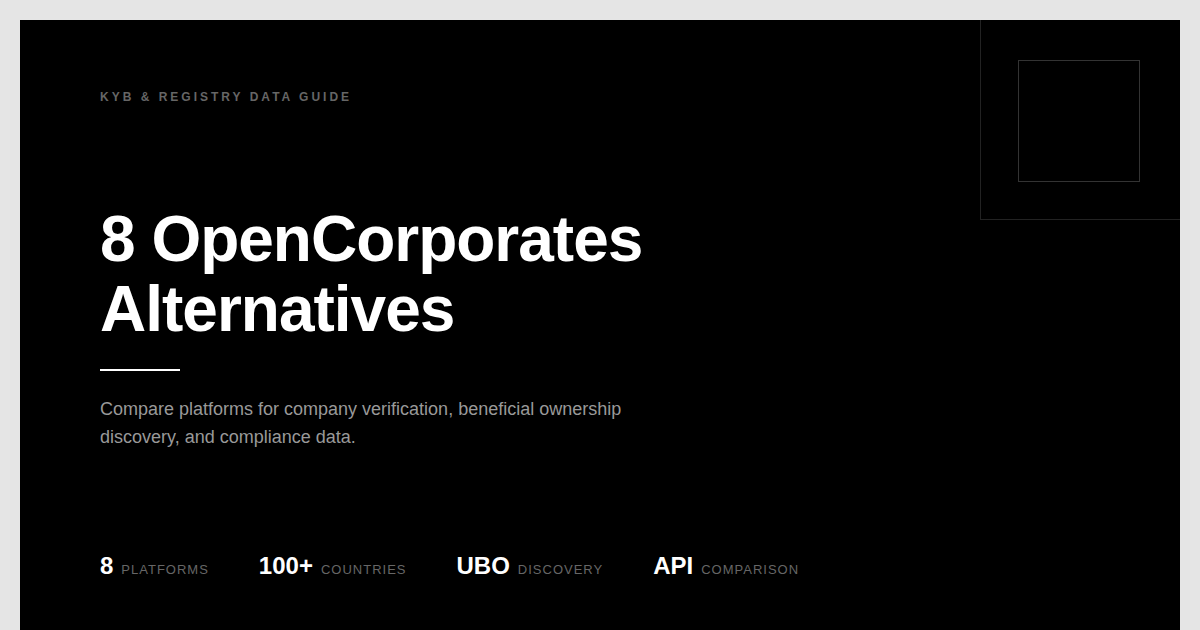
Top KYB APIs for Fintechs in 2025: Compare the Best Tools for Instant Business Verification
Verifying the legitimacy of a business partner, customer, or merchant is now a fundamental part of any fintech operation. Whether it’s onboarding new users, managing risk, or staying compliant with evolving AML and FATF regulations, fintech companies need instant access to reliable, up-to-date company information — not PDFs, not outdated spreadsheets, but real-time data through a simple API.
In 2025, the best KYB solutions combine global coverage, real-time registry connections, and flexible delivery formats that can integrate directly into onboarding and compliance workflows. But with so many providers on the market — from legacy vendors to new API-first platforms — choosing the right one can be a challenge.
This article compares seven top KYB API providers used by fintech teams worldwide. We evaluate them based on three core criteria: access to first-party registry data, ownership and UBO visibility, and how easily they can be embedded into your product or internal systems.
Global Database
Best for: Real-time KYB from official registries in 100+ countries
Global Database is a first-party data provider built for compliance, onboarding, and risk workflows. Unlike many legacy players, Global Database connects directly to over 100 government registries worldwide — offering verified, structured company data including registration numbers, legal status, addresses, UBOs, and shareholders.
The platform’s KYB API allows fintechs to instantly verify legal entities, validate tax IDs (including VAT, EIN, CNPJ, etc.), retrieve ownership structures, and monitor changes in real time. It also supports advanced use cases like UBO resolution, credit risk profiling, and international supplier verification.
What sets Global Database apart is its API-first delivery model, flexible licensing (including reseller and derivative product rights), and broad global coverage of registry-sourced data — making it a strong alternative to both legacy providers and scraped data vendors.
Highlights:
- Real-time data from 100+ official registries
- UBO & shareholder discovery
- Legal entity validation, tax ID checks (VAT, EIN, CNPJ, etc.)
- API, bulk, and CRM integrations (Salesforce, HubSpot, Dynamics)
Considerations:
- Contact data and enrichment available, but charged separately
- UI is secondary — best value is in API and bulk delivery
Monetaiq
Best for: Financial KYB insights and credit risk analysis across global entities
Monetaiq focuses on providing deep financial intelligence for KYB, credit scoring, and corporate risk assessment. Unlike standard registry data providers, Monetaiq combines verified company registration details with over 20 years of financial history, credit scores, and digital signals — making it ideal for fintechs that need to assess not just legal existence, but financial health.
Monetaiq sources financials directly from government registries and filings, and enhances them with proprietary algorithms to deliver structured, comparable data across borders. It also provides credit limits, payment behavior indicators, and business activity signals, giving fintech platforms the tools needed to automate underwriting, evaluate suppliers, or assess B2B prospects.
With integrations available via API, bulk files, or directly embedded into internal tools, Monetaiq helps fintechs build smarter KYB and risk workflows that go beyond surface-level checks.
Highlights:
- 20+ years of company financial data
- Credit scores, limits, and payment behavior tracking
- Verified registry data across multiple jurisdictions
- Financial comparison across time and markets
- Available via API, bulk, and platform integrations
Considerations:
- Focused primarily on financial KYB, not broader ownership mapping
- Less suitable for UBO or shareholder identification use cases
LexisNexis
Best for: Regulatory compliance and enhanced due diligence
LexisNexis is a well-established provider in the compliance and legal intelligence space. Its KYB solutions are built for enterprise-grade use cases, offering access to business profiles, legal entities, and adverse media coverage from a vast network of proprietary and public sources.
While it does include corporate registry data, LexisNexis shines in high-risk screening and investigation. Its tools are often used for AML compliance, sanctions checks, PEP screening, and enhanced due diligence (EDD), making it popular among banks, insurers, and heavily regulated fintechs.
LexisNexis products are typically embedded into broader compliance systems and come with strong documentation, audit trails, and investigation tools — but often lack the flexibility or pricing transparency of API-first platforms.
Highlights:
- Extensive legal, regulatory, and adverse media coverage
- PEP and sanctions screening built-in
- Trusted by large enterprises and financial institutions
- Strong audit, reporting, and case management tools
Considerations:
- Registry data coverage varies by country and is not always real-time
- Higher cost and longer integration times
- Less developer-friendly compared to modern API-first providers
Dun & Bradstreet (DNB)
Best for: Global corporate hierarchies and standardized business identifiers
Dun & Bradstreet is one of the oldest and most recognized names in business information. Its KYB offerings are centered around the D-U-N-S Number — a unique identifier used globally to track legal entities, subsidiaries, and corporate hierarchies. DNB’s strength lies in its ability to map complex ownership structures and provide standardized data across jurisdictions.
Fintech companies often turn to DNB when they need consistent entity records across multiple markets, especially for onboarding large enterprises or managing supplier risk. DNB offers firmographic data, legal entity status, credit risk indicators, and some UBO-related information, although its ownership data can be limited depending on the country.
While comprehensive, DNB’s API and licensing structure can be rigid, and its data may not always come directly from primary registries, which may affect freshness in fast-changing markets.
Highlights:
- Global D-U-N-S identifier system
- Extensive database of corporate linkages and hierarchies
- Firmographics, credit risk scores, and limited ownership data
- Widely used by banks, insurers, and large enterprises
Considerations:
- Registry-sourced data is not always used directly
- Limited transparency on update frequency and source attribution
- Higher cost and licensing restrictions, especially for data redistribution
OpenCorporates
Best for: Open access to basic company registry data
OpenCorporates is the largest open database of companies in the world, with over 200 million legal entities indexed from national registries. Its mission is transparency, making it a go-to resource for basic company information like registration numbers, legal names, and incorporation dates — all openly licensed and accessible.
For fintechs looking for simple legal entity checks or to supplement their internal records, OpenCorporates offers a free API (with limits) and paid plans for broader access. However, the platform focuses on providing raw registry data without enrichment — meaning no credit scores, UBO insights, or structured ownership data.
Its strength lies in legal identifiers and basic transparency, but it’s not suited for more advanced KYB requirements where deeper insight, financials, or risk signals are needed.
Highlights:
- Access to company data from 140+ jurisdictions
- Transparent source attribution with links to original registries
- Open licensing for basic data use
- Useful for legal ID validation and basic KYB
Considerations:
- No UBO or shareholder data
- No financials, credit scores, or risk indicators
- Limited enrichment, and data freshness depends on registry sync schedules
Factiva
Best for: Adverse media checks and reputational risk monitoring
Factiva, a product of Dow Jones, is a powerful tool for KYB teams that need to go beyond basic registry checks and assess reputational or media risk. It aggregates content from over 30,000 premium news sources, including global newspapers, trade publications, and regulatory watchlists — making it ideal for adverse media screening during onboarding or periodic reviews.
While not a registry data provider, Factiva is often used alongside KYB APIs to enrich due diligence workflows. Fintechs and compliance teams use it to flag potential red flags, such as fraud, litigation, or regulatory sanctions tied to the entity or its key stakeholders.
Its strength lies in uncovering what structured data may miss — but Factiva is a research tool more than a standalone KYB solution, and doesn’t offer real-time company verification or legal entity validation.
Highlights:
- Global news coverage from 200+ countries
- Strong for reputational risk and EDD use cases
- Adverse media screening for both companies and individuals
- Integration options for compliance workflows
Considerations:
- No registry or ownership data
- Not suitable for core KYB tasks like legal entity verification
- More of a media intelligence tool than a KYB API
Bureau van Dijk (Moody’s)
Best for: Deep ownership structures, financials, and compliance-grade data
Bureau van Dijk (BvD), a Moody’s Analytics company, is known for its Orbis platform — one of the most comprehensive databases for corporate ownership, financials, and entity-level risk data. It sources information from local registries, credit agencies, and proprietary research to create highly detailed company profiles, often used in high-stakes compliance and financial analysis.
For fintechs operating in regulated markets or serving enterprise clients, BvD offers unmatched depth in mapping corporate hierarchies, beneficial ownership, and cross-border linkages. It also includes standardised financials, industry classification, and sanctions screening modules.
However, BvD is not API-first. Its solutions are typically used via web platform or bulk data feeds, and licensing is expensive and restrictive, especially for product integration or redistribution.
Highlights:
- Extensive global coverage of UBOs, shareholders, and corporate structures
- Historical financials and standardized reports
- Strong reputation in banking, insurance, and compliance sectors
- Detailed entity risk and screening data
Considerations:
- Not designed for real-time KYB via API
- Licensing is complex and restrictive for embedding or resale
- Best suited for back-office analysis, not developer-first workflows
What is an API for Fintechs?
An API (Application Programming Interface) for fintechs is a software interface that allows financial platforms to securely exchange data with third-party services in real time. These APIs are used for tasks like business verification (KYB), identity checks (KYC), payments, credit scoring, and risk assessment — helping fintechs automate compliance, streamline onboarding, and scale operations efficiently.
Why use a KYB API in fintech?
Using a KYB API allows fintech companies to instantly verify business entities, identify Ultimate Beneficial Owners (UBOs), and access real-time company data directly from official sources. This is essential for:
-
AML and FATF compliance
-
Fraud prevention
-
Faster onboarding of merchants or business clients
-
Reducing manual data collection and human error
-
Building automated, scalable compliance workflows
What is Business Verification?
Business verification — often referred to as Know Your Business (KYB) — is the process of validating the legal existence, ownership structure, and risk profile of a company. This involves confirming registration details, tax identifiers, shareholders, UBOs, and checking for sanctions, adverse media, or regulatory red flags. In fintech, business verification is a legal and operational requirement for working with B2B customers or partners.
How do data vendors collect and compile data?
Data vendors collect information from multiple sources, including:
-
Government and commercial registries (first-party data)
-
Financial filings and credit bureaus
-
Open data platforms and corporate websites
-
Proprietary databases and third-party aggregators
Some vendors offer real-time registry connections, while others rely on batch updates or web scraping. The best KYB providers prioritize structured, verified, and regularly refreshed data to ensure compliance and accuracy.
What types of data do KYB providers typically offer?
Typical data points include:
-
Legal entity name, registration number, and status
-
Tax IDs (e.g., VAT, EIN, CNPJ)
-
Registered addresses and contact details
-
Shareholders and UBOs
-
Financial statements and credit risk indicators
-
Sanctions, PEP, and adverse media flags
-
Company hierarchies and global linkages
What makes a KYB API suitable for fintech use?
The best KYB APIs for fintechs in 2025 share the following features:
-
Real-time access to government registries and primary sources
-
Global coverage across 100+ jurisdictions
-
UBO and shareholder transparency
-
API-first delivery with easy integration into compliance workflows
-
Flexible licensing for use in internal tools, apps, or onboarding systems
-
Reliable data freshness and update frequency
-
Optional enrichment layers like credit scores, media checks, or financial history
Which KYB API is best for my fintech platform?
It depends on your specific use case:
-
For real-time registry data: Global Database
-
For financial insights and credit scoring: Monetaiq
-
For sanctions and enhanced due diligence: LexisNexis or Factiva
-
For UBO mapping and deep ownership: Bureau van Dijk (Moody’s)
-
For basic registry lookups: OpenCorporates
-
For global enterprise mapping: Dun & Bradstreet (DNB)
Conclusion: Choosing the Right KYB API for Your Fintech Stack
The KYB landscape in 2025 is diverse — from open databases to enterprise-grade platforms and agile, API-first providers. The right choice depends on your fintech’s specific needs:
- Need real-time verification and global registry access? Global Database is a clear leader.
- Looking for financial signals and credit risk? Monetaiq delivers deep insight.
- Managing high-risk onboarding or enterprise compliance? LexisNexis and Bureau van Dijk remain solid, if less flexible, options.
- Want a free starting point or legal entity validation? OpenCorporates is transparent and accessible.
- For media risk and enhanced due diligence? Factiva fills that gap.
- Working with global supply chains or large multinationals? DNB’s hierarchy mapping is unmatched.
No single provider covers everything perfectly. Many fintechs now combine multiple data sources — using one for real-time KYB, another for financials, and another for PEP/sanctions screening. What matters most is that your KYB workflow is fast, accurate, and scalable — and that your provider fits your business model, risk appetite, and integration needs.
For fintechs building global onboarding systems, automating compliance, or scaling embedded finance products, the future of KYB is real-time, API-driven, and backed by official data at the source.

